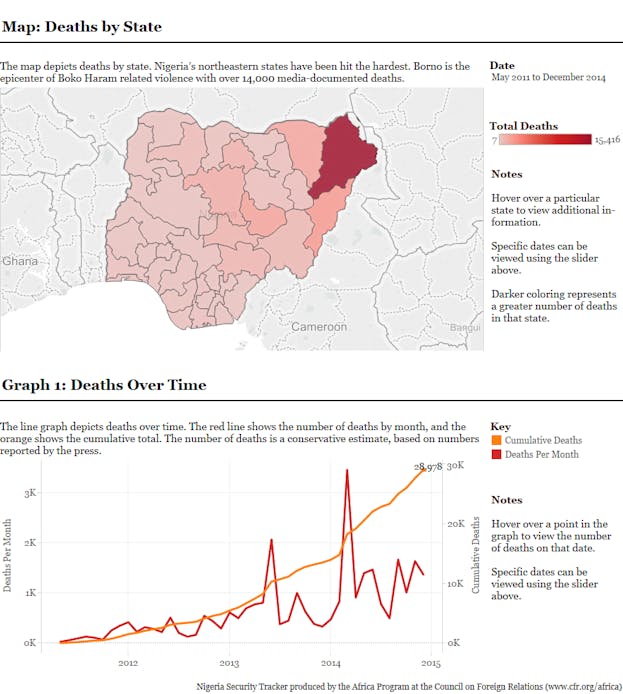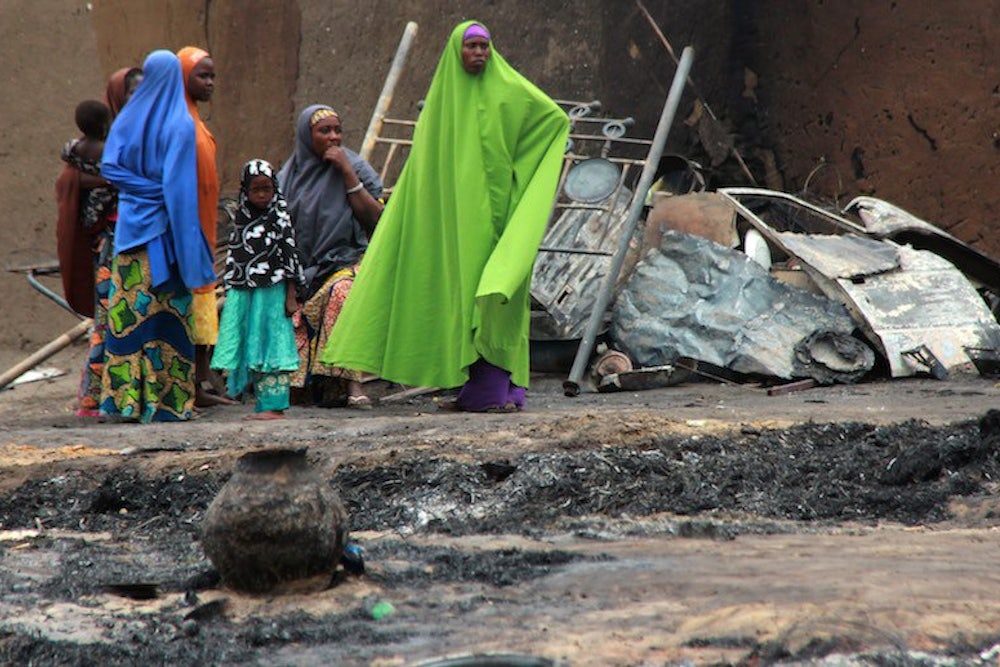On Saturday, Boko Haram militants seized the Nigerian Multi-National Joint Task Force Base in Baga, one of the few strategically significant towns still under the military control in the northeastern state of Borno. Borno’s senator, Ahmed Zanna, said that Nigerian soldiers deserted their posts, handing Boko Haram heavy weaponry and vehicles in the process. Locals say that militants razed 16 towns with petrol bombs and shot indiscriminately at civilians. As of Thursday, dozens of people are confirmed dead, 2,000 are missing, and an estimated 30,000 are displaced.
Though the attack began five days ago, it does not appear that the White House or State Department have provided an official comment on the attacks. This is the most recent tweet on the Twitter account for the U.S. Embassy in Abuja:
#CGHawkins: “Make no mistake about America’s commitment to helping find solutions to Nigerian Challenges.” pic.twitter.com/Kg3PtUe6qW
— U.S. Mission Nigeria (@USEmbassyAbuja) January 6, 2015Boko Haram has been waging an insurgency against the Nigerian government since 2009, with the goal of establishing an Islamic state with sharia rule. The Council on Foreign Relations estimates that there have been 15,000 deaths related to the conflict.

Violence peaked in 2014 after the government imposed emergency rule in the three states, including Borno, that were hit hardest by the insurgency in 2013. Security agencies “have orders to take all necessary action, within the ambit of their rules of engagement, to put an end to the impunity of insurgents and terrorists,” said President Goodluck Jonathan when he announced the state of emergency in May.
Giving the military a freer reign was an unpopular move in Nigeria. In 2013, Human Rights Watch (HRW) released satellite images documenting 2,275 homes in Baga that were destroyed by soldiers in the hunt for Boko Haram militants. HRW describe the military as “engaged more in destruction than in protection.”
On Monday, Boko Haram leader Abubakar Shekau posted a video on YouTube, warning against intervention from outside states. “Oh Paul Biya," he said, referring to Cameroon’s president, "if you don’t stop this, your evil plot, you will taste what has befallen Nigeria… Your troops cannot do anything to us.” Cameroon borders Nigeria to the east, and Biya has vowed to “totally wipe out” Boko Haram. Shekau continued, “Your troops are nothing. Even Nigerian soldiers couldn’t do anything to us. Even U.S. troops couldn’t do anything to us. Not even the troops of the whole world.”
Meanwhile, the more than 200 Nigerian girls who were abducted by Boko Haram last year are approaching their ninth month of captivity. The U.S. has contributed hostage negotiators, surveillance drones, and intelligence analysts to the search. In May, Robert Jackson, a State Department specialist on Africa told the Senate Foreign Relations subcommittee, "Resolving this crisis is now one of the highest priorities of the US government.”
The U.S. government's support in the fight has been limited by several factors. The Leahy law prohibits the U.S. from giving assistance to a military with documented human rights abuses. In a letter to Defense Secretary Chuck Hagel, Human Rights First said, “The military has been accused of raping, torturing, and killing civilians. When Nigerian civil society groups took to the streets to demand government action to rescue the missing girls, the security services arrested some of their leaders.” The letter continued, “In this context, we urge you to be frank with your counterparts in Nigeria about how their security forces have contributed to this crisis."
